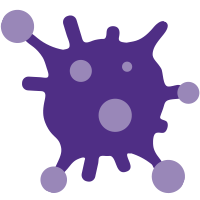
Immunology of Infectious Disease News
Immunology of Infectious Disease News is an online resource dedicated to covering the latest research and developments in the field of infectious diseases.
Anti-Sporozoite Monoclonal Antibody for Malaria Prevention: Secondary Efficacy Outcome of a Phase II Randomized Trial
[Nature Medicine] Investigators reported the prespecified secondary efficacy endpoint that used a Plasmodium 18S rRNA quantitative reverse transcription–PCR assay that is ~2,000-fold more sensitive than thick blood smear.
CagA-Dependent Hobit Gastric Tissue-Resident Memory T Cells Confer Full Protection from Reinfection.
[Gut] Researchers investigated the induction, development and function of gastric TRM cells during primary and secondary H. pylori infection.
Epitope-Optimized Influenza Hemagglutinin Nanoparticle Vaccine Provides Broad Cross-Reactive Immunity against H9N2 Influenza Virus.
[ACS Nano] Investigators reported an epitope-optimized nanoparticle vaccine that elicits broad cross-reactive immunity against the H9N2 influenza virus.
Antigen Persistence and TLR Stimulation Contribute to Induction of a Durable HIV-1-Specific Neutralizing Antibody Response
[Nature Communications] Researchers used Newcastle Disease Virus-like particle platform to present stabilized versions of HIV-1 Env glycoprotein at high valency and in the context of varied conformational stability, adjuvants, dose, and antigen persistence.
Unveiling EXOC4/SEC8: A Key Player in Enhancing Antiviral Immunity by Inhibiting the FBXL19-STING1-SQSTM1 Signaling Axis
[Autophagy] Scientists identified exocyst complex component 4 (EXOC4)/SEC8 as a novel positive regulator of DNA virus-triggered type I interferon signaling responses through stabilizing STING1, thereby inhibiting DNA viral replication.
Endogenous competition and the underrealized reproduction of infectious diseases.
[Proceedings of the National Academy of Sciences of the United States of America] Scientists described a mechanism overlooked in most conventional analyses, in which a disease can endogenously “compete” with itself when multiple infectious individuals race to infect the same susceptible individual, thereby reducing the effective reproductive rate.
Burden of Cardiovascular Outcomes after SARS-CoV-2 Infection in South Korea and Japan: A Binational Population-Based Cohort Study
[Circulation] This large-scale, population-based binational cohort study with long-term follow-up aimed to investigate the association between SARS-CoV-2 infection and the risk of cardiovascular events.
Unveiling the Structural Spectrum of SARS-CoV-2 Fusion by In Situ Cryo-ET
[Nature Communications] Scientists designed a near-native viral fusion system that recapitulates SARS-CoV-2 entry and use cryo-electron tomography to capture fusion intermediates leading to complete fusion.
No Evidence of Immune Exhaustion after Repeated SARS-CoV-2 Vaccination in Vulnerable and Healthy Populations.
[Nature Communications] Researchers examined the impact of repeated SARS-CoV-2 vaccination on T cell phenotypic and functional exhaustion in frail older adults in long-term care, individuals on immunosuppressive drugs, and healthy adults, in Canada.
Molecular Insights into Noncanonical Influenza Virus Replication and Transcription.
[Annual Review of Virology] Scientists discuss current understanding of the molecular steps that underlie noncanonical transcription and replication and which molecular mysteries remain.
Advancements in single-cell techniques for examining the HIV reservoir: pathways to a cure.
[mBio] The authors highlight current single-cell approaches, including single-cell sequencing, chromatin accessibility assays, and multiomic techniques, as tools for uncovering the heterogeneity and resilience of HIV reservoirs.
Global Virus Network Issues Scientific Guidance on New COVID-19 Variant NB.1.8.1 and Vaccine Protection
[Global Virus Network] The Global Virus Network is closely monitoring the emergence of a newly identified SARS-CoV-2 variant, NB.1.8.1, a sublineage of the Omicron family. This variant was first identified in January 2025 and has rapidly spread across Asia and into other regions, including parts of the United States.
Immunology of Infectious Disease News was founded to keep the scientific community current with the latest developments in infectious disease research. We feature high-impact publications, news, jobs, and events focused on immune responses to and the development of treatments for infectious diseases such as COVID-19, HIV, hepatitis, tuberculosis, influenza, and malaria.

 Cancer Stem Cell News
Cancer Stem Cell News Cell Therapy News
Cell Therapy News Dermal Cell News
Dermal Cell News Endothelial Cell News
Endothelial Cell News ESC & iPSC News
ESC & iPSC News Extracellular Matrix News
Extracellular Matrix News Hematopoiesis News
Hematopoiesis News Hepatic Cell News
Hepatic Cell News Human Immunology News
Human Immunology News Immune Regulation News
Immune Regulation News
 Intestinal Cell News
Intestinal Cell News Mammary Cell News
Mammary Cell News Mesenchymal Cell News
Mesenchymal Cell News Muscle Cell News
Muscle Cell News Neural Cell News
Neural Cell News Organoid News
Organoid News Pancreatic Cell News
Pancreatic Cell News Prostate Cell News
Prostate Cell News Pulmonary Cell News
Pulmonary Cell News
